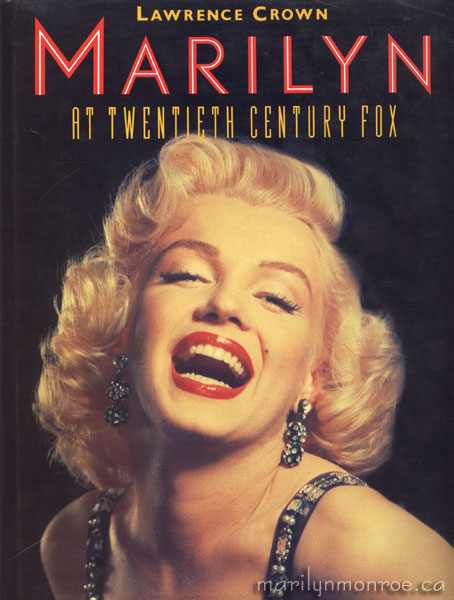 |
This book has lots of interesting information and rare photos from some of Marilyn's films. Of course it only includes her Fox movies so Some Like it Hot and The Misfits are missing. This is more of a photo book than text. There are standard shots from the actual films but lots of rare photos too. A few of the costume tests I don't think are published in any other books. It is a beautiful book with an unique approach and I highly recommend it. |
||||||||||||||||||
|
|||||||||||||||||||
| |||||||||||||||||||
|
BOOK REVIEW BY DAVID MARSHALL Have any of you seen the Rock
Hudson-narrated documentary, “Marilyn”? It’s not often shown on TV and to
my knowledge is not available on either video or DVD. The film, theatrically
released in 1963, was memorable primarily as the first time any of the
“Something’s Got To Give” footage was shown. Other than that, the film was
pretty much a wash out, a mishmash of Marilyn movie trailers with Hudson’s
somber commentary befitting the short time that had passed since August 1962 and
April 1963 when the film hit the theaters. But even twenty or thirty or even
forty years after Marilyn’s death and the initial release of the documentary,
one can’t help but look at it and think of a bunch of corporate suits getting
together and brainstorming how they can go about earning yet another nickel on
what was once their biggest money maker. And, if I am completely truthful,
that’s the same feeling that comes over me when I read “Marilyn at Twentieth
Century-Fox”. Maybe if I, like you, didn’t know as much of the Marilyn
Monroe story as I do, I wouldn’t feel the same way. But realizing that
Marilyn’s greatest films were those she made while not under the Fox yoke, one
can not help but feel somewhat manipulated while looking at the “Marilyn”
documentary or leafing through Lawrence Crown’s book. It doesn’t help
matters much when you look at the copyright page and find that Marilyn’s old
studio is the enmity that owns the copyright to the book and not Mr. Crown. However, all that aside, if one
can pretend that “Some Like It Hot”, “The Prince and the Showgirl”,
“The Misfits”, never happened, “Marilyn at Twentieth Century-Fox” is a
terrific, glossy, lushly illustrated coffee table book. Back in the day before
online groups and attachment sharing, this book was even more worthwhile as it
was pretty much the only one that offered several pages of terrific stills from
that last project, the never to be realized “Something’s Got To Give”. And
in 1987, that was saying something. Twenty-some pages of full page photos from
this then-unseen treasure was more than enough to convince me that I could
afford the asking price. Now, all these years later, I have
grown to appreciate the book more than I did say five or ten years back. Sure 20th
is basically squeezing every dime they can out of a former asset, but then, who
isn’t? If Marilyn can hawk Mercedes Benz all these years after her death, why
shouldn’t Twentieth Century-Fox jump on the bandwagon as well? If there are
folks out there, like me, who can get a kick out of seeing the initial reviews
of “O’Henry’s Full House”, the press packages for “As Young As You
Feel”, or the transcript of the trailer for “Love Nest”, who can blame the
studio for offering it all up in one big glossy package? And believe it or not, there are
pictures in the book that I have yet to see on the internet. Lauren Bacall and
Marilyn doing a bit of a mambo on the set of “How To Marry A Millionaire”.
Cary Grant tying the laces to Marilyn’s skates on the set of “Monkey
Business”. Marilyn and Jane posing with who the hell knows who after pressing
their hands and feet into the cement in front of Grauman’s. I’m an addict
and I fully admit it. If the supplier is the same corporation that paid the
blonde substantially less than the brunette, I have only myself to berate and
not the studio itself. After all, they are only providing a product for which
there continues to be a demand. The surprise is that there is more
to the text than the same old, same old. While admitting that I bought the book
only for the photographs and didn’t actually read it until many years later, I
was delighted to come across some of the more obscure tidbits provided by such
old hand Fox employees as Whitey Snyder, Roy Craft and Harry Brand. In addition
to the reprinting of studio written press releases, (such as the “story”
behind Marilyn’s hair color changes), throughout the book the reader is
treated to interviews with those who worked the lot during MM’s reign and
snippets of newspaper articles, biographies, and Marilyn movie scripts. This
might not be the stuff run of the mill movie fans are looking for but we’re
not exactly run of the mill movie buffs here, are we? So the question is, do you take
some sort of political stance and refuse to buy the book to pay the folks who
short-changed Marilyn’s talent and paycheck? Or do you decide that regardless
of how the studio may or may not have treated its primary asset, admit that
without Zanuck and 20th Century-Fox we might not be aware of a woman
named Marilyn Monroe? I may not care for the source but I would still humbly dip
my head and pay my money to bring home the book, hoping that Marilyn wouldn’t
mind. I still feel kind of guilty about it though. But what can I do? I am
addicted and sometimes I don’t really care where I find my next fix. |
|||||||||||||||||||
